Manufacturing
- Details
- By David Cao
- Hits: 1126
Chery Automobile, China's largest indigenous car maker, will basically stay away from overseas acquisitions even though it has been approached repeatedly, its chairman said on Tuesday.
"We have been offered many fancy proposals (by investment bankers). Their business is to buy and sell," Yin Tongyao said in an interview published on Sohu.com, a Chinese Internet portal.
"They want you to get married today and split the next day, this is typically what investment bankers do...and we won't be hoodwinked."
Yin also denied overseas media reports about Chery's purchase of a Fiat car plant on the Italian island of Sicily.
"I was told that foreign media said we had bought a Fiat plant. There is no such thing," Yin was quoted as saying.
Italy's La Repubblica newspaper had reported that Chery was in talks to take over the Fiat car factory.
Industry sources said that they were "bemused" and did not see it making sense for Chery, as the plant is on an island and the logistics of exporting had hampered its current owner, Fiat.
Chery executives could not be reached immediately for comment. Fiat declined to comment.
Still, many other Chinese automakers have been chasing Western brands to take advantage of a global industry downturn.
Beijing Automotive Industry Holding Co, the country's fifth largest automaker, has acquired some assets of General Motors' Saab unit as part of a push to develop its own-brand cars. Geely Automobile Holdings group has also been named preferred bidder for Ford Motor's Volvo car business.
Chery, maker of one of China's best-selling compact cars QQ, had also tried to raise its profile by cooperating with foreign automakers, but refrained from doing so to avoid risks, Yin said.
Rather than acquiring and trying to revive an overseas brand, Chinese automakers can also work their own way up to the higher end, he said in March.
Also in that month, Chery unveiled its first self-developed medium-to-high end sedan, Riich G6, which Yin and other Chery executives hope can eventually compete with Volkswagen AG's famed Audi A6.
In July 2007, Chery and Chrysler LLC agreed to manufacture compact cars under the Chrysler badge for sale in the Americas, but the plan was aborted after Nissan Motor reached a similar pact with the US automaker.
It has delayed a car venture with Fiat, which later forged a manufacturing partnership with Guangzhou Automobile.
- Details
- By David Cao
- Hits: 1055
Zhejiang Geely Holding Group aims to conclude the acquisition of Ford Motor's Volvo Car Corp in early 2010 and has hired consultants for restructuring and integration, sources with direct knowledge of the deal said.
German-based Roland Berger Strategy Consultants has been hired to launch a 100-day internal review and restructuring to improve Geely operations with a focus on sales of Geely's self-branded cars in China, according to a source.
"The Volvo deal sees no more hurdles," said another source.
"It is expected to be done before Chinese New Year, and then Geely will quickly launch integration," said the source, who declined to be named due to the sensitive nature of the deal.
The Chinese New Year will start on Feb 14.
A Geely spokesman was not available for comment.
Geely Chairman Li Shufu, who is also the chairman of the Hong Kong-listed Geely Automobile Holdings, has hired Deloitte Touche Tohmatsu, to work on post-acquisition integration for Volvo.
The focus will be on the integration of marketing and sales in China, network distribution, logistics and joint global operations, the source said.
"Li Shufu wants to do something like Lenovo-IBM -- have a foreign headquarters and a China headquarters," he added.
Ford has selected Geely as the preferred bidder for its loss-making Swedish unit Volvo in a deal estimated to be worth about $1.8 billion. Geely, China's largest private carmaker and the producer of such mass market models as the Geely Kingkong, is seeking at least $1 billion in loans from Chinese banks to finance the deal.
Wolfgang Bernhart, a partner at Roland Berger, told mainland media earlier this year that markets and technology were the two main drivers for Chinese automakers chasing overseas brands such as Volvo, Saab and Hummer.
"Personally, I think there is the likelihood of success of such mergers and acquisitions," he said.
- Details
- By David Cao
- Hits: 1697
China launched Wednesday a remote-sensing satellite, "Yaogan VII," from the Jiuquan Satellite Launch Center in northwestern Gansu Province.
The satellite was successfully launched into the space on a Long March 2D carrier rocket at 4:42 p.m., the center reported.
It will be mainly used for scientific experiment, land resources survey, crop yield estimates and disaster prevention and reduction, according to the center.
The satellite was developed by the China Academy of Space Technology under the China Aerospace Science and Technology Corp. The rocket was designed by the Shanghai Academy of Spaceflight Technology, also under the corporation.
The flight was the 120th of the Long March series of carrier rockets.

A Long March 2D rocket carrying the remote-sensing satellite "Yaogan VII" lifts off from the Jiuquan Satellite Launch Center in northwestern Gansu Province, December 9, 2009.
- Details
- By David Cao
- Hits: 1159
Geely Holding Group Co, the Chinese carmaker in talks to buy Volvo Car Corp, said the Swedish company would retain ownership of technology following a sale by Ford Motor Co.
Geely, which is offering to buy 100 percent of Volvo, has financing in place for the deal, Yuan Xiaolin, a spokesman for the Chinese automaker, said on Friday in Beijing. Ford named Geely as preferred bidder for Volvo in October.
Intellectual-property protection remains a stumbling block in the takeover because Ford will continue supplying components following a sale. Similar patent concerns derailed Beijing Automotive Industry Holding Co's bid to buy General Motors Co's Opel unit, the Chinese carmaker's chairman said in July.
Read more: Geely says Volvo to retain technology after purchase
- Details
- By David Cao
- Hits: 1591

With competitive prices and improved quality, China's steel giant Sinosteel Corporation is exploring the market potential in Turkey's steel industry as an equipment provider and contractor.
The Sinosteel Equipment and Engineering Co., Ltd. (Sinosteel MECC), a subsidiary of Sinosteel, had completed construction of 16 steel-producing or related projects in Turkey in the past decade, with a contracted value of 200 million U.S. dollars, Pan Xiaoyong, Sinosteel MECC representative in Turkey told Xinhua.
The company had another 11 projects under way, with a total investment of 300 million U.S. dollars, said Pan.
Sinosteel MECC provided Turkish steel mills with mining and steel-producing equipment at prices considerably lower than those offered by western companies, which helped the company to win market opportunities, said Pan.
More Articles …
Page 38 of 55